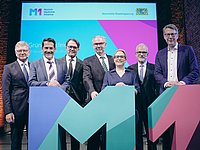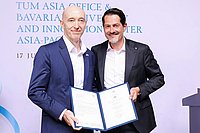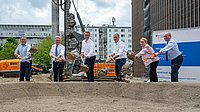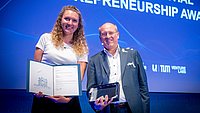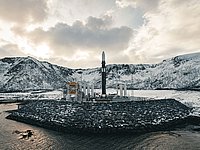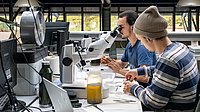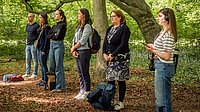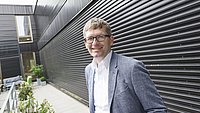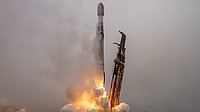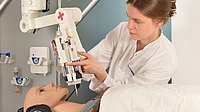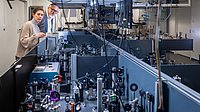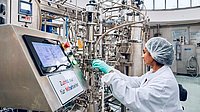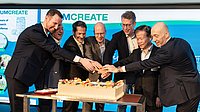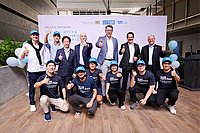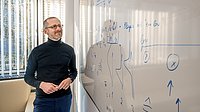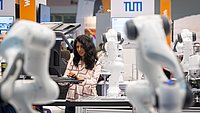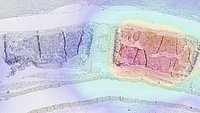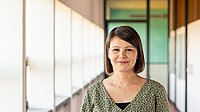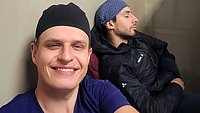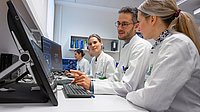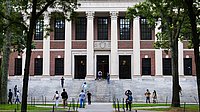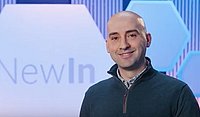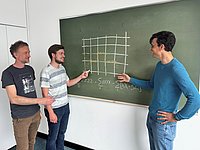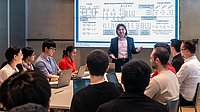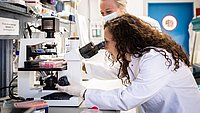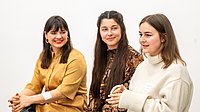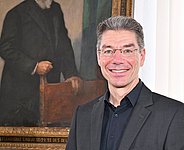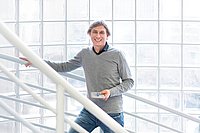 "Thinking of biology as technology"
"Thinking of biology as technology"
Professor Simmel, what are you and your colleagues researching in the new BioSysteM Cluster of Excellence? Essentially, it's about being able to design and control biological systems in a targeted manner – in other words, not just understanding biology but actively designing it. This used to be called "synthetic biology", but today, we tend to refer to it as "engineering biology." The aim is to design molecular building blocks – usually proteins or DNA – in such a way that they perform specific tasks. These components can then be assembled into larger biological systems. So, it's basic research with a strong focus on applied biotechnology? Biotechnology has been around for a long time, of course. The difference is that we don't just use biological processes; we construct completely new systems at the molecular level – sometimes even from scratch. One example is the design of artificial cells or molecular machines and motors. Our goal is to recreate, combine, or specifically improve biological functions – whether for medical, materials science, or even entirely new applications. How does artificial intelligence help in this? Enormously. AI-supported processes enable us to design proteins that never existed in nature. Many of these processes are highly complex and challenging to predict – AI can help to recognize patterns and suggest optimal designs. That is why we have established our own "AI Core Unit" within the cluster, with data scientists who directly support our research. This is complemented by an advisory board, which includes experts such as Karsten Borgwardt from the Max Planck Institute. Which disciplines work together in BioSysteM? We have a strong interdisciplinary approach: biophysics, biochemistry, molecular biology, bioengineering, computer science – and, of course, medicine. It is important to us to promote cooperation not only thematically but also structurally. This applies, for example, to developing complex cellular models such as organoids, which we can use to simulate biological systems – right down to tissue-like structures. A central principle here is self-organization: Many of the systems we design consist of a multitude of components that interact with each other. This interaction can give rise to entirely new functions and properties that cannot be derived from the properties of the individual parts alone. What specific goals do you have for the cluster? In addition to basic research, we also pursue application-oriented "M-Projects" – M stands for Mission or Munich. Here, several groups work together toward a clear goal – such as developing novel therapeutic concepts or diagnostic tools. One of these projects deals with the question of how cells can be targeted more specifically – via complex patterns on the cell membrane. This would be relevant for immune or cell therapy, for example. So, you are talking about identifying and targeting cells in a very specific way using certain patterns. Can this approach be taken even further? Would that ultimately result in something like intelligent nanorobots in the blood? The vision is not entirely wrong, even if the image is somewhat simplified. The aim is to develop molecular systems that recognize signals, respond to them, and, for example, become therapeutically active. You can think of them as mini-sensors that respond to a disease pattern and release targeted active substances – autonomously and without side effects for healthy cells. What other areas of application do you see? In addition to medicine, we see great potential in sustainable bioproduction. For example, we could develop novel enzyme cascades that allow substances to be produced more efficiently. There are also exciting prospects in materials science, such as bio-inspired sensors in robotics. How important is public perception of your research to you? It's central. We know that most people have little access to biological research – and at the same time, there is great interest but also skepticism, for example, towards genetic engineering. That is why we want to actively involve the public: with so-called "Biomolecular Design Studios", which we are implementing together with the Deutsches Museum. There, laypeople will be able to gain insight into our research – through experiments, exhibitions, and discussions. Is this also a contribution to linking science and ethics? Absolutely. We want to talk openly about risks and opportunities. Many of the methods we work with take place outside living organisms anyway – for example, in artificial cell models. Nevertheless, we have to reflect on what we are doing. To this end, we have brought science and technology sociologist Ruth Müller on board, among others, who is particularly interested in the social context. Some would say that what you are doing is the opposite of evolution – it is design. Yes and no. In many cases, we actually use evolutionary principles: we create many variants of a system, test their performance, and select the best ones. Combined with AI, rational design, high-throughput experiments, and evolutionary principles, this creates a powerful tool. This is a new research paradigm that differs fundamentally from previous approaches in biology. We want to think of biology as technology.
 Platform for digital seals and signatures
Platform for digital seals and signatures
